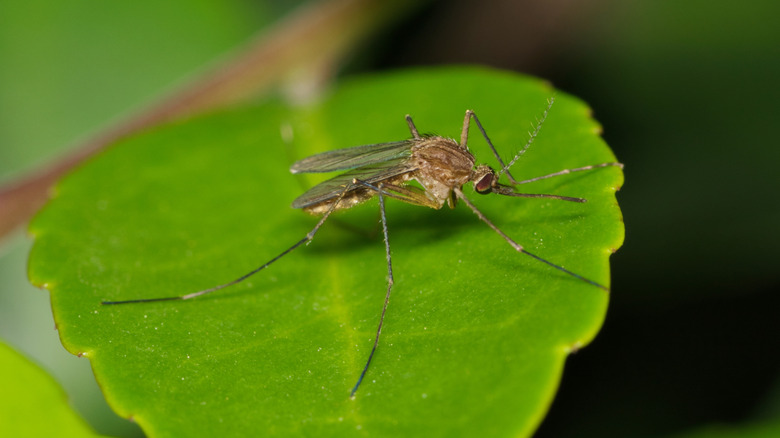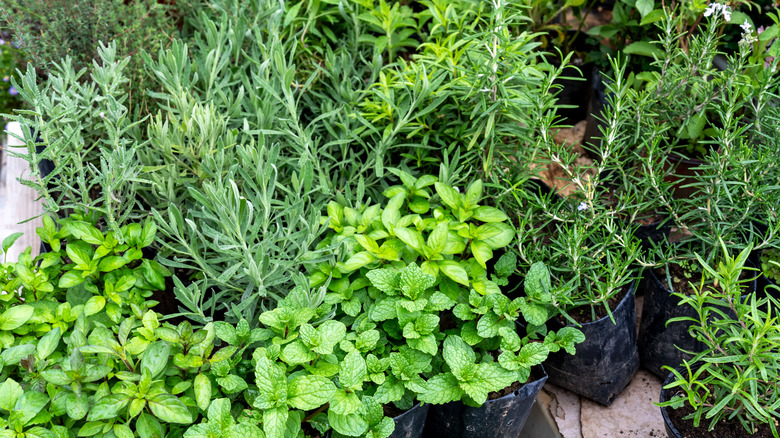You're Using Your Mosquito Repelling Plants Wrong - Here's What To Do Instead
When summer comes around, so does your desire to go outside and enjoy everything nature has to offer. Well, you might not enjoy everything if you are not a fan of bugs. Mosquitoes, in particular, can cause lots of problems. Aside from the annoying itchiness their bites bring, mosquitoes are carriers of dangerous diseases. In the United States, some types of mosquitoes spread viruses like West Nile and Zika. Even bites from nuisance mosquitoes that do not spread viruses can lead to infections if severe itchiness leads to scratching that breaks the skin.
Some people try to use a variety of fragrant flowering herbs to repel mosquitoes. The main mistake that you might make is to not access the oils inside of the plants that actually work to repel these insects. Just planting these mosquito repellants will not protect you. Popular options like citronella, lemongrass, catnip, rosemary, and lavender – while not on the list of active ingredients approved by the Environmental Protection Agency for deterring mosquitoes – have chemicals that stop mosquitoes from feeding on them that may also help keep these pests away from you. However, even if you have the right plants, you may still find yourself dotted with mosquito bites if you are using the them incorrectly.
Why your mosquito-repelling plants are not working
If you have chosen one of the mosquito-repelling plants, found a perfect spot for it in your yard, cared for it, and are ready to sit back and relax without being interrupted by bugs, you will be disappointed. There are some common essential oils people use to repel mosquitoes that can be found in the plants, but just planting them is not enough. While these plants protect themselves from mosquitoes with the oils trapped inside of them, that protection does not extend outside of their leaves and stems. Planting them and hoping they will force mosquitoes out of your yard with no action on your end will not work. You need to release the oils by cutting, crushing, rubbing, or burning the leaves of the plants.
Even if you are crushing the plant leaves and agitating them before rubbing them on your skin, you might not notice a significant decrease in the number of mosquitoes landing on you and biting. The first reason for this is that the oils from these mosquito-repelling plants evaporate very quickly, and once the oil has evaporated, often in about one or two hours, you have lost any potential protection. So, if you plan to rely on your own plants as mosquito deterrents, you will need to frequently reapply. The other potential reason is that your plant simply may not be producing enough oils to be effective, meaning you would need to crush quite a few leaves to get any benefit.
How to effectively use plants to repel mosquitoes
For the best, most effective results of a mosquito-repelling plant, the steps are fairly easy. First, take some leaves and crush them. You should be able to see the wet oil on the leaves. Then, after making sure that you are not allergic to the oil, rub it onto your skin. Learn the oil volatility for your specific plant so that you can reapply as frequently as necessary, or estimate that reapplication is needed every one to two hours.
You can also try burning mosquito-repelling plants. Whether you are grilling on a nice summer night or sitting around a campfire, tossing some rosemary or other mosquito repelling plant into the fire or on the grill may help keep mosquitoes away. Just like crushing a leaf releases the oils from the plants, so too does burning. As the smoke blows around your yard on a windy day or sits in the air on a still day, your yard should be a mosquito's nightmare of unappealing oil odor, keeping them away.
Although these plants may not be as effective as DEET or other ingredients approved by the Environmental Protection Agency, it may be worth it for you to try planting some mosquito repellents. Whether you are crushing or burning plants, if you are tired of mosquitoes and looking for more solutions, you may be interested in learning about some household staples that repel mosquitoes like magic. Just be cautious about using alternative methods in regions where mosquitoes carry diseases, as proper protection is extremely important in these areas.


